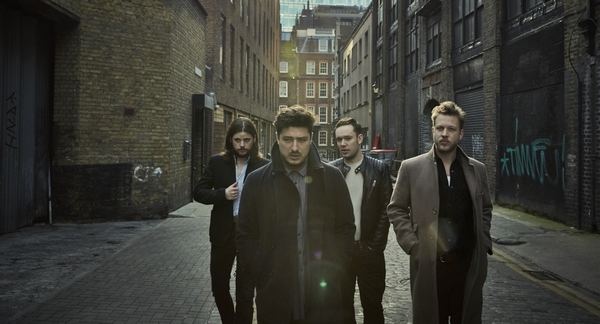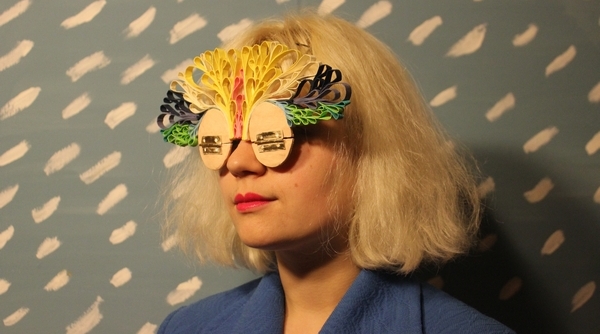“We never pegged ourselves as a folk band,” bassist Ted Dwane says. Dwane’s just returned to London after playing a run of intimate gigs showcasing Wilder Mind across North America. The band members have spent the last few days reacquainting themselves with their older material before beginning an extensive tour next month.
“Growing up as kids, we were like, ‘Electric guitars for days,’ just like all of the other kids,” Dwane says. “We started out with all of the banjos and that sort of stuff almost as a reaction against what everyone else was doing.”
But after touring for years behind their Grammy-nominated debut, Sigh No More, and its chart-topping follow-up, Babel, the band grew fatigued of their rootsy sound. To remedy this, they started experimenting with new instrumentation. By the end of 2013’s Babel tour, the band was playing around with electric guitars in sound checks, jamming out on Radiohead songs.
“We’re creative people, we kind of get bored and we wanted to push the boundaries out a bit,” Dwane says. “I think we pushed them a little further than we planned to, but we were just having a really good time.”
Following the Babel tour, Mumford & Sons took what was supposed to be a six-month break; their first proper break in nearly five years. But Dwane, keyboardist Ben Lovett, electric guitarist Winston Marshall and frontman Marcus Mumford were writing so much during their time off that they decided to cut the break short and reconvene after four months. With a wealth of new material, the band headed to the Brooklyn garage studio of The National’s Aaron Dessner, who they met while playing at Chicago’s Lollapalooza.
Over the next six months, the four-piece flew back and forth between New York and London, working on demos and writing what would become Wilder Mind. It was these sessions that brought the band closer than ever, something Dwane credits to Dessner’s encouragement.
“He basically taught us how palatable each other’s ideas were,” he says. “It was just a really informal, really loving, open sort of thing which was honestly something that we hadn’t embraced before. We hadn’t had the opportunity to be so free as that.”
With this freedom came a shift in the band’s sound, a move that Dwane says wasn’t a conscious decision, but rather the result of having the time to explore new sounds and tastes. “It was a fun record to make and something creatively for us really exciting. It was a breath of fresh air, bringing new life into all of us, all of our devotion to each other and the band.”
Along the way, Mumford & Sons drew inspiration from the music of a few new friends and a few old ones. Fleetwood Mac and The War on Drugs’ new album Lost in the Dream were on heavy rotation, alongside staples like The Beach Boys, Michael Jackson and Led Zeppelin. When asked if he would’ve imagined that they’d record an album like Wilder Mind back in the Sigh No More days, Dwane replies with an emphatic “Yes.”
“I certainly would have hoped to have done that,” he says. “I think the whole spirit of Mumford & Sons is one of collaboration and one of exploration.”
It’s this spirit that resonates throughout Wilder Mind, whether it be on sunny sing-along Just Smoke or power-rocker Ditmas, on which the band’s lyrical prowess is strong as ever, with woeful lines like, “Your words are as empty as the bed we made.”
Naturally, the new sound has also led to a revamp of Mumford & Sons’ live show. One of Dwane’s best friends has taken on full time drumming duties; a welcome development for a bassist that has gone eight years without a drummer. As for the question of the old versus the new, Dwane is confident that songs from Wilder Mind will fit right in with the rest of their catalogue. “There will be fans that are freaked out when they hear [Wilder Mind],” he says, “but in the context of a wider set, I think it will make sense.”
Fans across North America and Europe will get the opportunity to hear the new material live when Mumford & Sons head out for a run of headline shows, festival appearances and their own mini-festival series Gentlemen of the Road Stopovers beginning in June. They hope to make their way back to Australia within the next couple of years and plan to put on another event similar to the two-day camping festival they curated in Dugong in 2012.
But for now, Mumford & Sons aren’t playing the role of the unlikely rock stars anymore.
“I think we’d hope that people who do understand the spirit of the band and the nature of creativity wouldn’t expect us to knock out a third album in this sort of trilogy,” Dwane says. “I hope that people will just enjoy it, because for us, it’s the best thing we’ve done and we’re really, really proud of it.”
BY LAUREN GILL

